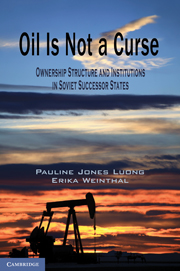Book contents
- Frontmatter
- Contents
- Tables
- Figures
- Maps
- 1 Rethinking the Resource Curse
- 2 Why Fiscal Regimes
- 3 State Ownership with Control versus Private Domestic Ownership
- 4 Two Versions of Rentierism
- 5 Petroleum Rents without Rentierism
- 6 State Ownership without Control versus Private Foreign Ownership
- 7 Eluding the Obsolescing Bargain
- 8 Revisiting the Obsolescing Bargain
- 9 Taking Domestic Politics Seriously
- 10 The Myth of the Resource Curse
- Appendix A List of Authors’ Interviews
- Appendix B Variation in Ownership Structure in Developing Countries
- Appendix C Responses to Select Life in Transition Survey (LiTS) Questions by Age Group
- Appendix D Ranking Basis for Determining which Countries are Included in Our Database
- Works Cited
- Index
9 - Taking Domestic Politics Seriously
Explaining the Structure of Ownership over Mineral Resources
Published online by Cambridge University Press: 05 June 2012
- Frontmatter
- Contents
- Tables
- Figures
- Maps
- 1 Rethinking the Resource Curse
- 2 Why Fiscal Regimes
- 3 State Ownership with Control versus Private Domestic Ownership
- 4 Two Versions of Rentierism
- 5 Petroleum Rents without Rentierism
- 6 State Ownership without Control versus Private Foreign Ownership
- 7 Eluding the Obsolescing Bargain
- 8 Revisiting the Obsolescing Bargain
- 9 Taking Domestic Politics Seriously
- 10 The Myth of the Resource Curse
- Appendix A List of Authors’ Interviews
- Appendix B Variation in Ownership Structure in Developing Countries
- Appendix C Responses to Select Life in Transition Survey (LiTS) Questions by Age Group
- Appendix D Ranking Basis for Determining which Countries are Included in Our Database
- Works Cited
- Index
Summary
For reasons elaborated upon in Chapter 1, the literature on the resource curse has heretofore viewed ownership structure as a constant rather than a variable. In particular, this literature is characterized by a prevailing assumption that mineral wealth is always and necessarily state-owned and centrally controlled. Consequently, it has not invoked ownership structure as either a possible explanation for the empirical correlation between mineral abundance and a myriad of negative social, political and economic outcomes – poor economic performance, unbalanced growth, impoverished populations, weak states, and authoritarian regimes – or a possible remedy.
Yet the empirical reality is that ownership structure varies considerably both within and across mineral-rich states over time. If one takes a broader and more nuanced view, it becomes clear – at least regarding petroleum-rich states – not only that state ownership is not inevitable but also that it is accompanied by different degrees of state control. We provide such a view in Chapter 1 (see Figure 1.1) based on an original database of ownership structure in petroleum-rich states in the developing world from the late 1800s through 2005 (see Appendix B for details).
- Type
- Chapter
- Information
- Oil Is Not a CurseOwnership Structure and Institutions in Soviet Successor States, pp. 299 - 321Publisher: Cambridge University PressPrint publication year: 2010



